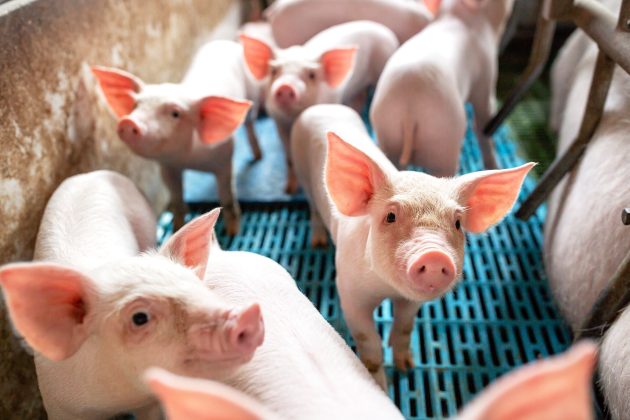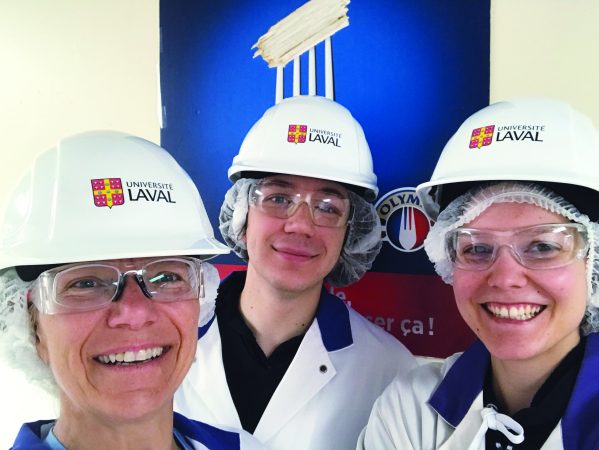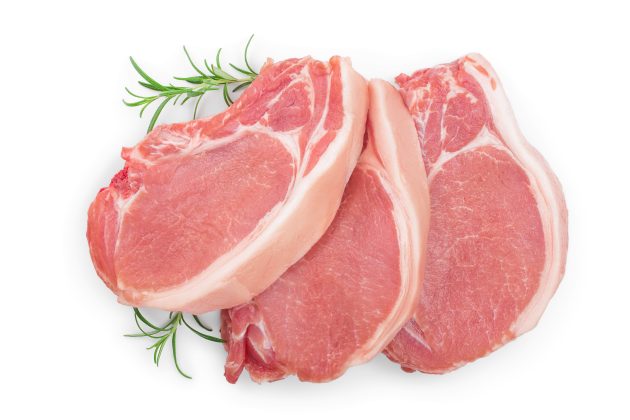
Testing the impacts of antibiotic alternatives on pork quality and safety
By Lilian Schaer for Canadian Food Innovation Network
Research & Development Meat &Poultry Agriculture and Agri-Food Canada Canadian Food Innovation Network Food innovation food safety Olymel Quebec Université Laval Photo © Didesign021/Getty
Photo © Didesign021/Getty Canadian hog farmers are increasingly moving away from using antibiotics in pork production.
Weaning – when young piglets stop nursing and switch to solid feed – remains a critical step in pig development where the animals are particularly susceptible to infection as their immune systems are still developing.
So to keep animals healthy, hog farmers are using alternatives like probiotics that can boost the immune system by promoting better gut health.
However, there are still a lot of unknowns about the impact that influencing the pig’s microbiome will have on the quality, safety and shelf life of pork products. That’s why Olymel, Canada’s largest pork producer and processor, is working with scientists from Université Laval and Agriculture and Agri-Food Canada on research to gain a better understanding of the links between gut health, food safety and product quality.
Their research is part of the Canadian Food Innovation Network (CFIN) Emerging Science Research Cluster.

Linda Saucier and students at Olymel. Photo courtesy Université Laval
“There is very little research on the microbiome and the impacts of using antibiotic alternatives and better herd management in pork production,” explains Dr. Sylvain Fournaise, Olymel’s vice-president of food safety and technical services. “Food safety and public health are a top priority for Olymel so we are committed to doing everything we can to understand and control any potential risks.”
With resistance to antibiotics posing a growing threat to global public health, livestock farmers in Canada and other countries are looking for alternatives and new management practices that will maintain the health, welfare, and production efficiency of livestock without compromising food safety.
The project has three main objectives:
- Setting a baseline: Through metagenomic testing, researchers will identify the bacteria and bacterial families found in different stages of the value chain to determine whether bacteria found in the processing environment or on pork products originate in the microbiome of the animals themselves, or in the production or processing environments.
- Evaluating impact on the gut microbiome: Researchers will evaluate the effects of different probiotics on pig gut health and how the addition of probiotics combined with reduction of antibiotics influences the intestinal microbiome, as well as their impacts on the farm and plant environment, and carcasses and meat cuts.
- Piglet health: Researchers will compare the health and welfare of pigs raised in environments with different health statuses, with or without antibiotics and with or without probiotics, as well as evaluate the meat coming from these animals.

Photo © Kolesnikovserg/Getty
“What is interesting about the project we are working on together (with Olymel) is that we are particularly focused on the health status of farms and how the whole value chain can be influenced, how we can work at the level of microbial ecology, its detailed understanding and how we can modulate it positively – that’s our objective,” explains Dr. Linda Saucier of Université Laval.
Being able to work with Saucier and her team as a result of this project gives Olymel access to expertise and infrastructure not available on its farms, which allows for more sophisticated testing and analysis.
“The cluster funding is extremely important because it allows us to leverage the money we are already investing in research,” Fournaise says, adding that the addition of Agriculture and Agri-Food Canada to the research team adds complementary strength to the work being done. “This really gives a leveraging effect for the limited amounts that can be invested in research (by Olymel).”
To date, the project has generated five presentations in scientific congresses and allowed two students to win prizes/scholarships, in addition to being a notable contribution to scientific knowledge and an excellent window for students, research organizations, Olymel and the granting agency.
“Consumers today expect safe food and sustainable livestock production that respects both human health and animal welfare,” says Fournaise. “At Olymel, we are proud to produce high quality pork products that truly are feeding the world, and research like this is important to ensure we continue to be a global leader in this regard.”
Why is this innovation important?
- Enables replacement of antibiotics with more sustainable alternatives and promotes judicious use of antibiotics limited to critical periods, including weaning
- Improves safety and quality of pork products
- Better understanding of pig gut health boosts animal welfare and better control of microflora of the environment at both the farm and processing plant levels.
What does this project mean to Canada’s food processing industry?
Replacing antibiotics with more sustainable alternatives will ensure food safety and quality and further minimize the risks associated with antibiotic use in livestock production, as well as confirming Canada’s leadership role in this area.
About Olymel S.E.C/L.P.
Olymel is one of Canada’s leaders in the production, processing and distribution of pork and poultry meats. The company employs over 15,000 people and exports to more than 65 countries. Its brands include Olymel, Lafleur, Flamingo, Pinty’s, Tour Eiffel and more.
About the project team
Dr. Sylvain Fournaise is vice-president of food safety and technical services with Olymel S.E.C./L.P. He holds an MSc in food science and technology from Université Laval and a doctorate in veterinary medicine from the Université de Montréal.
Dr. Linda Saucier is professor and researcher in the Department of Animal Science at Université Laval. She has a PhD in microbiology from the University of Alberta and an MSc in food science and technology from Université Laval.
Dr. Guylaine Talbot is a research scientist in microbial ecology with Agriculture and Agri-Food Canada’s Sherbrooke Research and Development Centre. An adjunct professor at the Faculty of Science, Université de Sherbrooke, she has a PhD in Biochemistry from the Faculty of Medicine and Health Science at Université Sherbrooke.
The Canadian Food Innovation Network Emerging Science Research Cluster is funded in part through the AgriScience Program under the Canadian Agricultural Partnership, a federal-provincial-territorial initiative. For more information, contact Laura Sider, science co-ordinator, CFIN.
Print this page